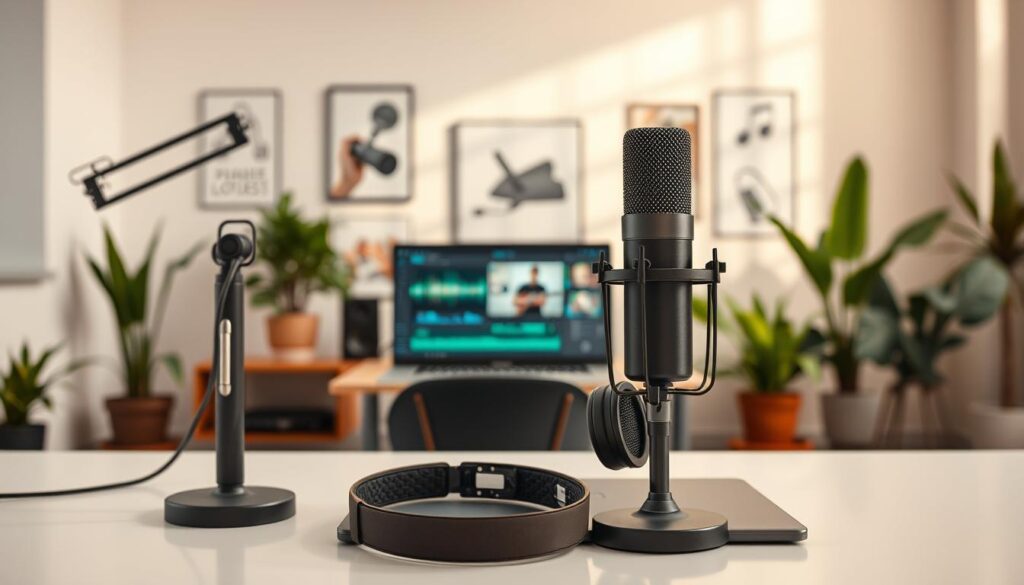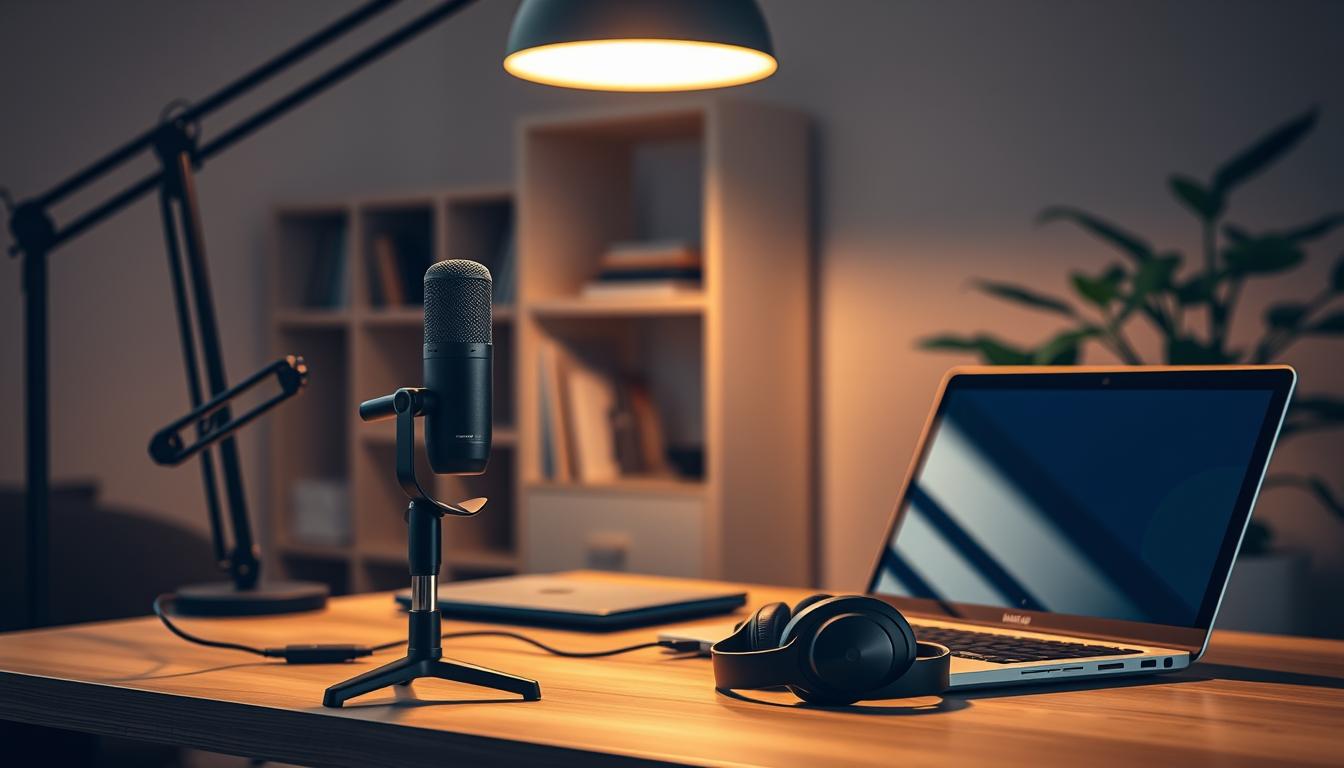Welcome to our guide on starting a podcast. If you’re new, you’re likely eager to share your ideas and stories with the world. Podcasting is now more popular than ever, with millions listening daily.
I’m here to help you start your podcasting adventure. Whether you want to grow your brand, promote your business, or just have fun, podcasting is a great way to do it. With the right tools and knowledge, you can make a show that your listeners will love.
Key Takeaways
- Learn the basics of podcasting for beginners and how to start a podcast
- Discover the benefits of podcasting and how it can help you build your personal brand
- Get tips on choosing the right equipment and software for your podcast
- Understand the importance of planning and preparing your podcast content
- Learn how to record, edit, and publish your podcast episodes
- Find out how to promote and grow your podcast audience
Why Podcasting Is Your Next Big Move
Thinking about starting a podcast opens up new opportunities for growth and connecting with people. With podcasting on the rise, it’s a great time to start a podcast and share my thoughts with others. By using key podcasting tips, I can make a show that really speaks to my listeners.
Podcasting offers many benefits. It lets me show my expertise, promote my business, and build a personal brand. Whether I want to entertain, teach, or inspire, podcasting is a strong tool for reaching my goals. Some main advantages include:
- Building a loyal following and community
- Establishing authority and expertise in my field
- Promoting products or services to a targeted audience
- Creating a unique and engaging form of content
By using these benefits and following good podcasting tips, I can make a podcast that helps me start a podcast and reach my goals. With the right strategy, podcasting can be a fulfilling and impactful way to connect with my audience and share my ideas.
Essential Podcast Equipment for Success
Starting a podcast means you need the right podcast equipment. It can be hard to choose what to buy, with so many options out there. Let’s look at the key items you’ll need for great podcast episodes.
A top-notch microphone is the base of your setup. You’ll also need headphones to listen to your audio and spot any mistakes. A computer or recording device is needed to record and save your episodes. Don’t forget a pop filter, boom arm, and acoustic treatment to improve your recording space.
Here are some important things to think about when picking your podcast equipment:
- Microphone: Pick a condenser or dynamic microphone that fits your style and budget.
- Headphones: Choose comfortable, closed-back headphones for accurate sound.
- Computer or recording device: Find a device that meets your storage and processing needs, like a laptop or digital audio workstation.
Finding the right podcast equipment means balancing quality and cost. Take your time to research and compare options to find what works best for your podcast.
Choosing Your Podcast’s Niche and Format
Starting a podcast means making key choices, like picking your niche and format. This helps you stand out and attract listeners. Think about what you love talking about. This will help you find your unique voice.
Popular podcasting tips suggest choosing a niche you know well. Also, pick a format that fits your style, like interviews or sharing stories. Here are some formats to think about:
- Interview-style podcasts, where you interview experts or thought leaders in your niche
- Storytelling podcasts, where you share personal anecdotes or fictional stories
- Educational podcasts, where you provide tips, advice, or instruction on a particular topic
After picking your niche and format, think about your audience. Who are they? What do they like and need? Create content that speaks to them. This way, you’ll build a loyal following.
Setting Up Your Home Recording Studio
Creating a professional-sounding podcast starts with the right podcast equipment. But, setting up a good recording space is just as key. You might just need a corner of your bedroom or office for podcasting. Start by improving your room’s acoustics with foam panels or soundproofing blankets.
Your home recording studio should also be well-lit and comfy. Get a good chair, a comfy desk, and a quality microphone stand. A well-set-up studio lets you focus on making great content, not technical issues.
- Get a good pair of monitor speakers for clear audio
- Use a pop filter to cut down on plosive sounds and distortion
- Keep your space tidy to avoid distractions
Follow these tips and get the right podcast equipment. You’ll be on your way to making a pro-sounding podcast from home. Always test your gear and space before recording to make sure everything’s working right.
Podcasting for Beginners: Technical Basics You Need to Know
Starting a podcast can feel overwhelming, especially with the technical side. To start a podcast, you need to know about recording software, audio editing, and file formats. We’ll cover the key podcasting tips to help you begin.
There are many recording software options, both free and paid. Audacity, GarageBand, and Adobe Audition are popular choices. Each has unique features, so it’s good to explore them to find the best fit for you.
Here are some important things to think about when picking recording software:
- Ease of use: Choose software with a simple interface.
- Features: Think about what you need, like editing tools and effects.
- Compatibility: Ensure it works with your computer or device.
By following these podcasting tips and picking the right software, you’re on your way to a great podcast. Remember, success comes from simplicity, enjoyment, and a willingness to learn and improve as you start a podcast.
Creating Compelling Podcast Content
As a podcaster, I’ve found that making engaging content is key to keeping listeners. One top podcasting tip is to have a content plan that speaks to your audience. This means knowing what they like and need, and making episodes that fit.
To make your content stand out, organize your episodes well. Use stories or real-life examples to make points clear. Also, having guests on your show can bring new views and insights.
Some important podcasting tips for great content are:
- Know your niche and audience
- Have a unique and interesting tone
- Use stories to share messages
- Do great interviews with guests
By using these tips, you can build a loyal fan base. Your podcast will become a go-to for info and fun. Always keep your audience in mind and update your content as they change.
Recording Your First Episode
Now that you have your podcast equipment ready and your content planned, it’s time to record your first episode. To make sure everything goes smoothly, create a pre-recording checklist. This will keep you organized and focused, helping you create a top-notch episode that will grab your listeners’ attention.
Before you start recording, find a quiet and comfy spot to work. This will help your podcast sound professional and polished. Think about getting a good pair of headphones and a pop filter to cut down on plosive sounds and boost sound quality.
- Speak clearly and at a moderate pace
- Take breaks to stretch and move around
- Stay hydrated and energized
By following these tips and using the rightpodcast equipment, you’re on your way to a successful podcast. Remember to have fun and be yourself. Don’t be afraid to try new things. With practice and patience, you’ll create a podcast that connects with your audience and stands out from the crowd.
Publishing and Hosting Your Podcast
Now that you’ve recorded and edited your podcast, it’s time to share it with the world. Publishing and hosting your podcast is key to reaching your audience. You’ll need to pick from free and paid hosting options to find the best one for you. By following podcasting tips, you can make sure your podcast goes out smoothly.
When choosing a hosting platform, think about storage, bandwidth, and support. Popular choices include Anchor, Buzzsprout, and Libsyn. Each has different features and prices, so it’s important to compare them. The right platform will help you focus on making great content and growing your audience.
To get more people to listen to your podcast, submit it to big directories like Apple Podcasts, Spotify, and Google Podcasts. This will help more people find and listen to your podcast. By following these podcasting tips and hosting your podcast well, you can build a loyal fan base.
Marketing Your Podcast for Growth
Now that your podcast is live, it’s time to think about marketing and promoting it. To start a podcast and grow your audience, you need a solid marketing strategy. This includes creating a plan, setting goals, and tracking your progress.
One of the most effective ways to promote your podcast is through social media. By sharing your episodes, engaging with your listeners, and using relevant hashtags, you can increase your visibility. This helps you reach a wider audience.
Here are some podcasting tips to help you market your podcast:
- Collaborate with other podcasters to reach new audiences
- Participate in podcasting communities to connect with other creators and stay up-to-date on industry trends
- Use paid advertising to reach a wider audience and increase your visibility

By following these tips and staying consistent with your marketing efforts, you can grow your audience. Remember to always keep your target audience in mind. Tailor your marketing strategy to their needs and interests.
With the right approach, you can start a podcast and turn it into a successful and engaging show. It will resonate with your listeners.
Monetization Strategies for Your Show
As your podcast becomes more popular, you might think about making money from it. With the right podcast equipment and podcasting tips, you can make your passion profitable. One good way is by looking for sponsorship deals. Many brands want to reach their audience, and sponsoring a podcast is a smart way to do that.
To find sponsors, knowing your podcast’s niche and audience is key. This helps you find sponsors that match your brand and values. You can reach out to brands yourself or use a podcast ad network to find them.
You can also look into listener support models. This means offering special content or perks to fans who support your podcast financially. Patreon and Ko-fi are popular options. By giving your listeners something extra, you build a loyal community that helps you make money.
- Offer exclusive content or perks to loyal listeners
- Use podcast advertising networks to connect with potential sponsors
- Consider offering merchandise or products related to your podcast
By trying out these monetization strategies and using the right podcasting tips and podcast equipment, you can make your podcast a success. Always keep your audience in mind and be creative in finding ways to make money.
Conclusion: Your Journey Into Podcasting Starts Now
As you finish this guide, I hope you’re excited to start your podcasting adventure. Starting a podcast is more than just recording episodes. It’s about finding your unique voice and connecting with your audience.
Podcasting can help you share your passion with the world. It’s a chance to build a platform, engage with others, or even make money. The key is to stay dedicated to your vision.
Podcasting might seem tough at first, but with the right tools and a willingness to learn, you can make a show that listeners love. So, what are you waiting for? Start podcasting for beginners today. Experiment, improve, and most importantly, have fun.
Your voice is important, and your story is worth telling. The world is eager to hear your podcast. Don’t miss this chance to share your unique perspective.
